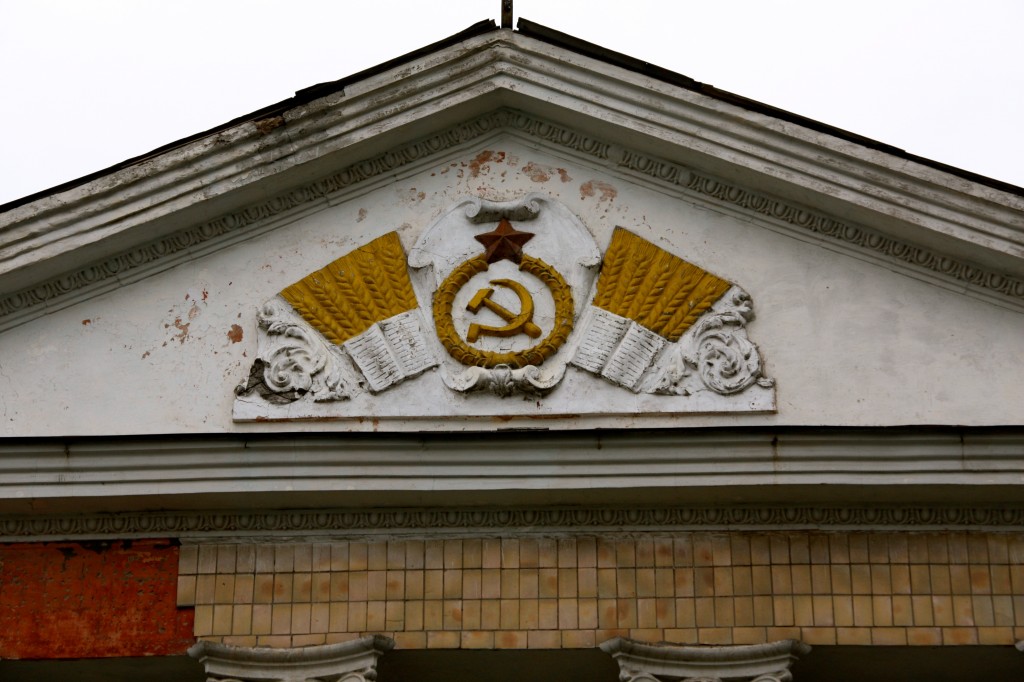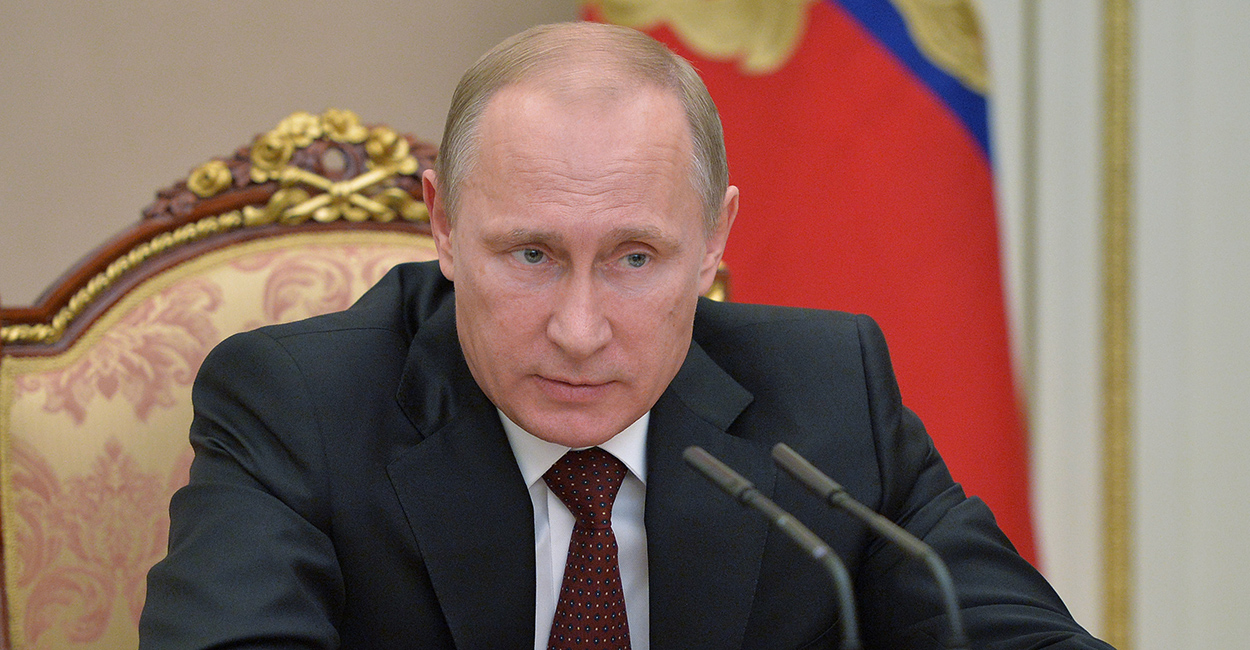LVIV, Ukraine—On Friday, a hush fell over the dozen or so customers in a coffee shop in this western Ukrainian city as President Petro Poroshenko appeared on television to give a speech commemorating the 70th anniversary of World War II.
“On May 8, for the first time, the people of Ukraine will join the European tradition to commemorate the victims of World War II,” Poroshenko said, speaking a day before celebrations in Moscow commemorating allied victory over Nazi Germany.
On Lviv’s streets, Ukrainian flags hung on street poles. Soldiers sauntered down the street in full dress uniforms covered in medals. Civilians wore red and black poppies on their lapels. This year, the poppy has become the new symbol of Ukraine’s remembrance of World War II, replacing the orange and black St. George’s ribbon, which is the traditional Soviet symbol of victory in the “Great Patriotic War”—and is now a symbol for pro-Russian separatists in eastern Ukraine.
Ukraine marked the 70th anniversary of the end of World War II Friday, preceding by one day a military parade in Moscow on May 9, the traditional date of when the end of the “Great Patriotic War” is celebrated in post-Soviet states.
“The very next day in Moscow,” Poroshenko continued, “under the pretext of the great victory, the aggressor’s army will brandish its lethal might in front of the world. Some of the units were in Donetsk a few days ago and soon they will appear on the military parade in Moscow.”
Friday’s celebrations marked another symbolic step by Kyiv to distance Ukraine from its Soviet past by celebrating, for the first time in 70 years, the end of World War II on the same day as the U.S. and Western Europe.
The move highlights an uptick in Ukrainian nationalism as a statement against Russian support for separatists in the ongoing war in eastern Ukraine.
Underscoring this trend, the Ukrainian parliament passed a series of laws on April 9, which banned Soviet and Nazi symbols throughout the country and officially replaced the “Great Patriotic War”—the Soviet name for World War II, which is still used in Russia—with the “Second World War.”
The law also banned the playing of the Soviet national anthem, the display of the hammer and sickle flag, and mandated the renaming of streets named after Soviet luminaries such as Vladimir Lenin.
Soviet symbols on a building in Slavyansk, Ukraine. (Photo: Nolan Peterson/The Daily Signal)
While the law banned both Nazi and Soviet symbols, its advocates focused on the importance of scrubbing reminders of Ukraine’s Soviet past as part of a contemporary effort to combat pro-Russian separatists, who, according to Kyiv, exploit Soviet interpretations of history to justify their cause.
“We are not erasing history, but we are erasing the remains of Soviet propaganda,” Ostap Kryvdyk, an adviser to the vice speaker of Ukraine’s parliament and an advocate of the law, told The Daily Signal. “If a street is named after Lenin, people think he still relevant and important. Not having renamed the streets earlier increases the effectiveness of Russian propaganda.”
Some worry, however, that the anti-Soviet measures may inflame divisions within Ukrainian society by playing to the Kremlin’s accusations that the government in Kyiv is pro-Nazi and oppressive to Ukraine’s Russian population.
“Of course, it’s a good thing to get rid of all this Soviet heritage,” said Oleksiy Melnyk, co-director of foreign relations and international security programmes at the Razumkov Centre, a Ukrainian think tank.
“But in the current situation any action like this should be checked against the main priority, which is winning the war,” Melnyk, who is a former Soviet air force officer and fighter pilot, added.
The Russian Ministry of Foreign Affairs did not immediately respond to requests for comment.
Speaking at an event in Moscow on May 5, however, Russian Foreign Minister Sergei Lavrov pushed back against what he called a contemporary trend in some democracies to promote “Nazi ideas and values.”
“The attempts to falsify history, put victims and executioners on the same plane, and glorify the Nazis and their henchmen are outrageous,” Lavrov said, according to the Russian Ministry of Foreign Affairs website. “The aim of these actions—and President Vladimir Putin has repeatedly spoken about this—is obvious: to provoke historical and political phobias and pit entire countries and nations against each other in order to gain one-sided geopolitical advantages and achieve global domination.”
“We will not allow the heroic deed of the victors over Nazism to be debased or the truth about the Great Patriotic War to be distorted,” he added.
Vladmir Putin (Photo: Newscom)
The war in eastern Ukraine has killed more than 6,000 Ukrainian civilians and military personnel, according to the United Nations. There are no reliable estimates for casualties among the pro-Russian separatists, although some Ukrainian military officials have privately claimed that 8,000 separatists and 5,000 regular Russian soldiers have been killed in the fighting.
Ukraine and the U.S. have said Moscow is equipping the separatists with weapons and ammunition and has sent soldiers into Ukraine. Moscow continues to deny it is supporting the separatists.
On Saturday, Moscow plans to commemorate the 70th anniversary of the defeat of Nazi Germany with a military parade. Concurrent celebrations will also take place in the separatist stronghold of Donetsk in eastern Ukraine. Photos published to Facebook by U.S. journalists based in Donetsk show separatist tanks practicing for ceremonies displaying paint schemes identical to Russian tanks preparing for Saturday’s parade in Red Square.
About 1.7 million Ukrainian soldiers and 5.2 million civilians died in World War II, representing the death of more than 16 percent of Ukraine’s pre-war population. Among Soviet states, Ukraine’s proportional losses were second only to Belarus, which lost about 25 percent of its population in the war.











